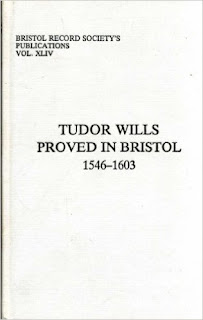This post is a short analysis of the brief mentions of 'Colliers' in Bristol Record Society's Publications Volume XLIV: TUDOR WILLS PROVED IN BRISTOL 1546 - 1603.
There are one hundred and ninety-two wills transcribed in the book, and perhaps not unsurprisingly, only two mention Colliers: one as a benefactor of a will and the other the will of the Collier himself.
The wills:
[Will] 67 MARGARET JOONS, widow, [St Thomas], (23 November 1597).
Testatrix’s debts 23 November 1597:
to Margery 10s
to Mistress Pr[e]wett 8s
to Mary Hill 2s
to Robert Stevens 3s 9d
to Richard Stevens 3s 4d
to “bucher the collier” 3s
to John Cooke 1s 4d
to Richard Lentorn 1s
to Robert Humphery 4s
Sick of body. Soul “to the hands of god my creator & to Jesus Christ my savior.” To be buried in the churchyard of St. Thomas.
Executrix Alice Maisy her Servant
Overseers: John Grigg and Thomas Prestwood.
Memorandum: “William Weall hath a ceverlett in pane [pawn] for v s”
[Will] 151 EDWARD AVERY, collier, St.Philip, 7 December 1600, nuncupative, proved 19 November 1601.
Soul to almighty God, body to be buried in St. Philip’s churchyard.
To daughter Fortune £3 which his brother-in-law Thomas Brewer owes him, one ewe and one lamb.
Residue to wife Alice, executrix.
Witnesses: Mr. Thomas Baynard, William Maynard, John Avery of St. Philip’s.
Analysis:
MARGARET JOONS
“Bucher the collier” is the only benefactor referred to by his trade and it is in inverted commas; I suspect this is reflecting Margaret's exact words of who she owes money to and only knew Bucher by his trade rather than Given name? This implies, to me at least, a less than personal relationship and the debt may well be for charcoal supplied for her domestic use? Jumping a bit to conclusions there, I know, but not a lot to analyse really...
EDWARD AVERY
This will is nuncupative, i.e. spoken not written; this could perhaps reflect the will of an illiterate man? Also, it took over eleven months to be proved, but looking through the book at other wills this does not seem uncommon and may reflect the legal process rather than anything unusual in Edward's will or estate that would cause delay?
The frustrating aspect to this will is it's brevity: he leaves his (beautifully named) daughter, Fortune, £3, a ewe and a lamb then the "Residue" to his wife. This might be illustrating he was a man of few processions or maybe he had too many to list, and as they were all going to his wife why bother listing them? The word residue, implies a small amount, but it is impossible to know. There is no mention of a house or chattels, but I am guessing he had land or at least grazing rights to own (at least) a Ewe and a lamb?
The frustrating aspect to this will is it's brevity: he leaves his (beautifully named) daughter, Fortune, £3, a ewe and a lamb then the "Residue" to his wife. This might be illustrating he was a man of few processions or maybe he had too many to list, and as they were all going to his wife why bother listing them? The word residue, implies a small amount, but it is impossible to know. There is no mention of a house or chattels, but I am guessing he had land or at least grazing rights to own (at least) a Ewe and a lamb?
His brother in law owes him a fair amount of money at £3 - a sack of charcoal sells at 8d (ish) in period - so £3 is 90 bags of charcoal... a good amount of work to produce this kind of capital to loan to anyone. This perhaps reflects that Avery had more interests than just charcoal making to have that kind of money to be owed him? Perhaps he was a small time husbandman too? St Phillips, his parish of residence was 'outside the walls' and rather nicely the Braun & Hogensburg map of Bristol, published 1581, shows plenty of sheep grazing around the city. I have highlighted St Philip's on the map below to show it's 'rural' nature.
So all in all I seem to have raised more unanswerable questions than anything else, but that's historical research for you.
 |
| Map from http://historic-cities.huji.ac.il/british_isles/bristol/maps/braun_hogenberg_III_2.html |
So all in all I seem to have raised more unanswerable questions than anything else, but that's historical research for you.
